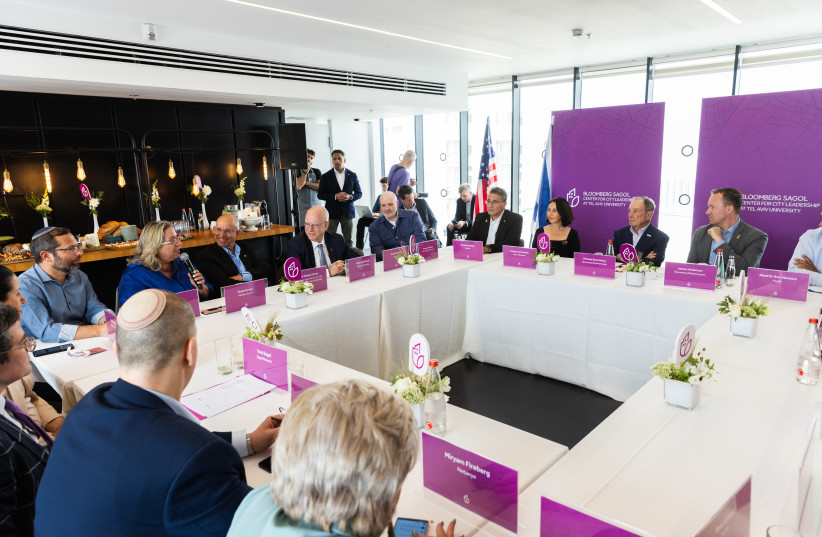Former New York City mayor and philanthropist Michael Bloomberg convened a roundtable discussion of Israeli mayors in Tel Aviv on Thursday to launch a recovery and repair innovation initiative for the hardest-hit cities in Israel amid the war; it was unveiled exclusively to The Jerusalem Post.
The initiative, under Bloomberg Philanthropies, intends to provide both support and expertise based on vast experience in other conflict zones to the most affected communities across Israel that suffered following the massacre on October 7 and during the subsequent war.
Committed to providing support for Israel during the war
“I know this continues to be an extremely difficult time for everyone – and for Israel – and that’s why I’m here,” Bloomberg said in his opening remarks. “I have great confidence in Israel’s future – because I believe in the power of those values.
“Those values have been attacked before – and they will be attacked again. But time and again, we have seen the power of people who believe in those values to overcome the worst in human nature. That is America’s story – it is Israel’s story – it’s the story of the free world and it endures because it connects to something deep within the human spirit that no government, and no terrorist group, can kill.”
Seated at the roundtable were mayors from all sectors, Jewish and Arab alike, including Tzvika Brot of Bat Yam; Rafik Halabi of Daliat al-Carmel; Miriam Fierberg of Netanya; Mazen Ghnaim of Sakhnin; Rotem Yadlin of Gezer Regional Council; and Raed Daka of Baka al-Gharbiya.
The group gathered at the Bloomberg Sagol Center for City Leadership at Tel Aviv University to discuss a “new program that will help bring world-class expertise to support 65 localities,” according to Bloomberg.

Tel Aviv University President Prof. Ariel Porat said, “The Israeli government failed to provide its citizens with all kinds of different services. The municipalities could and should play an important role.”
Indeed, the program intends to see the development of regional innovation hubs designed to serve each cluster’s communities and their respective municipalities and help them rebuild stronger, with particular focus on the hardest-hit regions rather than individual cities because “regional dependency and interdependence amongst communities is such a big priority,” according to James Anderson, who established and leads the Government Innovation program at Bloomberg Philanthropies and is the architect of the organization’s work supporting mayoral leadership and driving local innovation in Israel.
Speaking to the Post, he said communities “really want our support... to enable and encourage that sort of regional thinking as communities build back better.”
The focus of Bloomberg Philanthropies
Bloomberg Philanthropies will focus specifically on bringing resources and capabilities in data science, the digitization of public services, program design, and collaboration management to develop and implement projects emphasizing recovery, resilience, and regional connectivity.
The mayors and municipal heads in attendance, in a closed-door discussion, raised questions and concerns that may be met through the initiative, and in turn, Bloomberg’s team of professionals is taking feedback, applying necessary customizations, and initiating customized programs specifically to help each affected area.
Anderson said, “The government innovation program at Bloomberg Philanthropies really comes from Mike and the fact that he is the only major funder on the globe, who also happened to have been a mayor” and therefore “understands the unique role mayors can play in moving us forward at the community level, at the national level, at the global level.
“We started our work in Israel 10 years ago, we brought our Bloomberg innovation model to Tel Aviv, Jerusalem Beersheba, and... all three of those cities do extraordinary things with that investment,” Anderson explained, adding that they are developing new programs according to the needs of cities around the world, and this is informing their choices in Israel, whether they learned it in Kyiv due to the Russia-Ukraine war or in New Orleans in the wake of Hurricane Sandy last decade.
Bloomberg revealed that “outside of the United States, we do more work with mayors in Israel than in any other country in the world – and that’s something that I know would’ve made my mother and father very proud. It’s times like this – times of crisis and conflict, when people are deeply worried about the future – that mayors are more important than ever.”
Indeed, Bloomberg’s personal experience in the centrality of mayoral leadership in times of crisis informed plenty of his work with mayoral programs through Bloomberg Philanthropies.
Bloomberg was mayor of New York City from the beginning of 2002, shortly after the September 11 attacks in 2001, during which four coordinated Islamist suicide terrorist attacks were carried out by al-Qaeda against the US, including two planes crashing into the Twin Towers of the World Trade Center.
“I learned very quickly that mayors have a unique opportunity to be beacons of hope – and to rally people behind a shared vision that unites people of all backgrounds and all religions,” Bloomberg said. “They also have a powerful role to play in helping communities recover and rebuild and to show residents that even in a crisis, government can work for them and get things done, whether that’s building infrastructure or getting families back in their homes and schools.”
